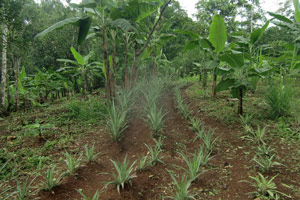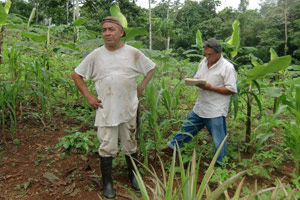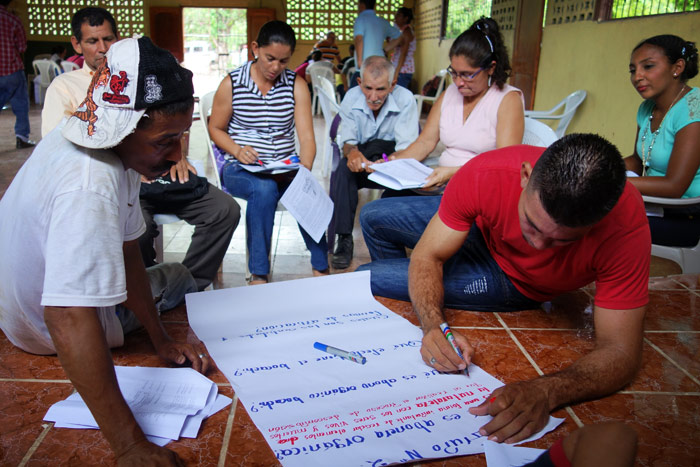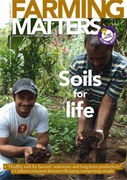Farmers who are trying to build up healthy soil on their land can find it a particularly prolonged process. Work with local community organisation in Nicaragua, however, shows that results can be seen relatively quickly and achieved on a broad scale, with a long-term farmer-led strategy. From its origins in the 1970s, The Council of Protestant Churches in Nicaragua (CEPAD) has been learning continuously and adapting its approach. And one of the key things they have learned is that if farmers want to build healthy soils, they have to start with healthy community organisations.
Their soils are now ‘alive’ again, with more worms, improved structure and water holding capacity.
Since the 1960s, the general trend towards monoculture, plantations and industrial agriculture has shaped large parts of Nicaragua’s landscape.
Expanding sugar, cotton, coffee and cattle farming have caused increasing deforestation, which in combination with the increased use of chemical fertilizers and pesticides, has led to soil erosion and a decline in the fertility and quality of the soil that remains. It did not take long for many of Nicaragua’s family farmers to see and recognise that soil degradation was threatening their livelihoods and ability to produce enough nutritious food. But what could they do?
In the 1980s, when the impacts of soil degradation became evident, the government did not seem concerned about protecting soil and water resources. There were many NGOs working on environmental issues and rural development, but relatively few projects and programmes had the aim of reversing soil degradation. CEPAD, a partner of Episcopal Relief & Development, was one of these organisations. From 1974 to 2004, CEPAD worked with farming families to help them take full advantage of their available land and improve the quality of the soil. Long periods were spent with rural communities to identify key challenges and develop strategies to address them. Soil and water conservation and reduction of agrochemical use came out as priorities that guided farmer-led experiments.
A knowledge network

The experiments generated much new knowledge, and it became evident that an effective process for knowledge sharing within communities was needed, in order to allow the scaling up of the best agroecological practices for healthy soils.
As a response to this, each community participating in CEPAD programmes now nominates ‘Community Agricultural Promoters’ (Promotores Agrícolas Comunidad, PACs). They represent their group at three training sessions each year, and are then responsible for teaching and accompanying five farmers in their own communities, as they introduce and adapt the new practices on their land. In addition, a series of exchange workshops are organised every year, in which the promoters act as facilitators and teachers, and farmers can all share their experiences.
Now, CEPAD works in a community for five to six years, allowing them to complete a three-year training cycle with two separate groups of promoters and the five accompanying farmers. This process enables them to share a core set of principles with other people in the wider community, while at the same time building an organised community network to share knowledge and offer long-term support as the farmers adopt and adapt some of the new practices.
In the past six years, CEPAD has worked with more than 1200 farmers in 43 communities across the country. The use of these soil enhancing practices has resulted in dramatic changes. Erosion is greatly reduced, and farmers report that their soils are now ‘alive’ again, noting more worms, improved structure and water holding capacity.
Focus on the soil
The combination of soil quality and land management can make the difference between producing enough food to live and eat well, or not. The families that CEPAD works with farm between 0.5 and 4 hectares, on which many grow mainly maize, beans and coffee, amongst other crops. With a few chickens and pigs, farming provides food for the average family of seven people, along with some cash income. The head of a household will also usually work a few days a week on a larger farm or in another industry, to bring in extra money.
However, farming communities across Nicaragua face varying challenges, so a key principle for CEPAD is supporting communities in choosing the solutions that best fit their own specific circumstances. For Antonio Hernández Ramírez and his family, who lives in San Francisco Libre, a relatively dry part of the country, it is a challenge to store enough moisture in the soils to ensure a reasonable harvest during the dry season. Antonio focused on a combination of enriching his soils with organic matter by using mulch and compost, and reducing risks of soil erosion by building contour bunds. He explains: “Now, I don’t burn the leaves that fall from forest trees, but leave them on the soil to maintain soil moisture.” He remembers when his plot only supported weeds but now he harvests plenty of food from the increasingly healthy soil: “I harvested 400 cushaw squash (pipián), 60 peppers (chiltoma) and 9 butternut squash (avote) this past season. This is enough to consume some with my family, share some with friends and sell some on the market.”
In another region, Moises de Jesus Garcia Chavez explains how he has stopped using chemical fertilizers and pesticides. Instead, he chose to begin producing compost, and has reduced pests and diseases by diversifying the range of crops he grows. “I am saving about US$100 each year by not buying agrochemicals. And I have seen my land transformed for the good of my family and my community, with more food, improved soils and improved habitats for wildlife in the area.”
Patience pays
They found that ‘less is more’, and will continue developing techniques together with farmers.
Change does not happen overnight, but in speaking with farmers that have employed these strategies, it is clear that most begin to see visible changes within the first year.
Octavio Saldaña Delgadillo, a PAC, explained, “After we add compost, the plants absorb nutrients, and the soil texture starts to change a little. So far I only have a small layer of better soil, and it will take time to improve more.” He explained in more detail the steps he was taking, including the use of natural pesticides and erosion control, and concluded: “This is a process. The change has been little by little.” Octavio is working hard and waiting for the day when he can stop working as a builder to earn extra income, and concentrate full time on the land he loves.
Another PAC , Juana Francisca López Saldaña, explained how she is working patiently to renew the land she obtained for herself after her husband’s death. Talking about the recent drought, she explained that while it had been a challenge, the actions she took had helped. “One of the advantages of using compost and improving our soil is being able to retain water in the soil for a longer time.”
Learning and adopting

A survey of 471 farmers who were supported by CEPAD between 2009 and 2012, showed that about 90% adopted ‘living erosion control’, such as planting grasses or other plants along contour lines to slow runoff and increase the percolation of water into the soil. Uptake of soil fertility measures such as use of biofertilizers, green manures and compost was equally impressive, with 70%, 80% and 100% of farmers using each practice, respectively.
One of the factors for this success was that the new practices were developed over long periods, and farmers were involved every step of the way, from identifying their key challenges to experimenting with new strategies. But, based on more than 30 years of experience in Nicaragua, CEPAD also knows of many cases where farmers stop using their new practices at the end of the training cycle.
An important lesson from this has been that it is important to focus on fewer and simpler techniques. They have found that ‘less is more’, and plan to continue developing the most suitable techniques together with farmers. Continuous evaluation, feedback and learning is paying off, and is helping to better meet farmers needs in the future.
Talking about trust
While reflecting on the widespread uptake in these new soil-building practices, it is clear that the long-term, farmer-led experiments helped to develop the most suitable soil conservation practices. Yet, farmers repeatedly raise trust and confidence as the two main reasons for success.
Farmers talk about how, when they first started using some new techniques, their neighbours would laugh at them or tell them they were crazy. But they persevered because they trusted what they had learnt and the advice they were given. And, farmers who are trying out new practices have other farmers in their own community, especially the PAC, who shows them what they can do and provides a place to turn for help. This is another relationship of trust that helps each farmer to keep going, especially when the work is difficult or the change is slow.
As Program Director Evenor Jerez said, “When producers, families, men and women are more organised and integrated, success is much easier to achieve.” This type of strategic community engagement is allowing farmers like Juana and Octavio not only to improve their soil, but it also helps them to become advocates and teachers for their neighbours – a result which is worth trying to learn from and emulate. Healthy community organisations help build healthy soils.
Sara Delaney, Denis Garcia and Audrey White
Sara Delaney is International Program Officer at Episcopal Relief & Development in New York, USA.
Email: sdelaney@episcopalrelief.org
Denis Garcia is the Manager of the Food Security and Environmental Protection Program at CEPAD in Nicaragua.
Email: gerentesaa@cepad.org.ni
Audrey White is a Communications Officer for CEPAD in Nicaragua.
Email: audrey@cepadusa.org


